
Prof Zoya Hasan, Professor Emerita, Jawaharlal Nehru University and Distinguished Faculty, Council for Social Development, New Delhi, will be delivering a Special lecture in the Democracy Dialogues Series, organised by New Socialist Initiative, at 6 PM, (IST) Sunday, 24 th April, 2022.
She will be speaking on ‘‘How did UP Decide: Identities, Interests and Politics”
Join Zoom Meeting
https://us02web.zoom.us/j/81240964790?pwd=OEd1OU00ejA5d1ZxYWlMRzFaOGNkdz09
Meeting ID: 812 4096 4790
Passcode: 975399
Facebook Live on – http://fb.com/newsocialistinitiative.nsi
Abstract
How did UP Decide: Identities, Interests and Politics
Uttar Pradesh has just seen an intensely contested assembly election which resulted in a second straight victory for the Bharatiya Janata Party in this politically crucial state. This momentous outcome is the subject of intense debate among analysts and indeed the public at large. There was a premise this time, particularly in UP, that communal polarisation wasn’t working because of acute economic discontent which could trigger electoral change. However, the large-scale discontent over many economic issues, including jobs, did not translate into a decision to vote out the government. Many analysts have attributed BJP’s reelection to welfare measures and free rations to the poor during the lockdown. This cannot explain BJP’s persistent success which extends beyond this election. The welfarist argument ignores the compelling logic of long term communalism and the systematic construction of the Hindu vote in UP politics since the time of the Ramjanmabhoomi movement centered in UP and the communal campaigns in the last five years, its impact is reflected in the election results.This construction of the Hindu vote also trumped the caste-based politics of the regional Samajwadi Party and Bahujan Samaj Party through a mobilization of upper caste and non-dominant backward and lower caste communities. Communal polarization and identity politics is the keystone of their strategy and the decisive factor driving electoral choices.











 This guest post by RAM KUMAR is a review of five years of Mayawati’s administration in Uttar Pradesh. An English translation has appeared in Fountain Ink magazine,
This guest post by RAM KUMAR is a review of five years of Mayawati’s administration in Uttar Pradesh. An English translation has appeared in Fountain Ink magazine, 